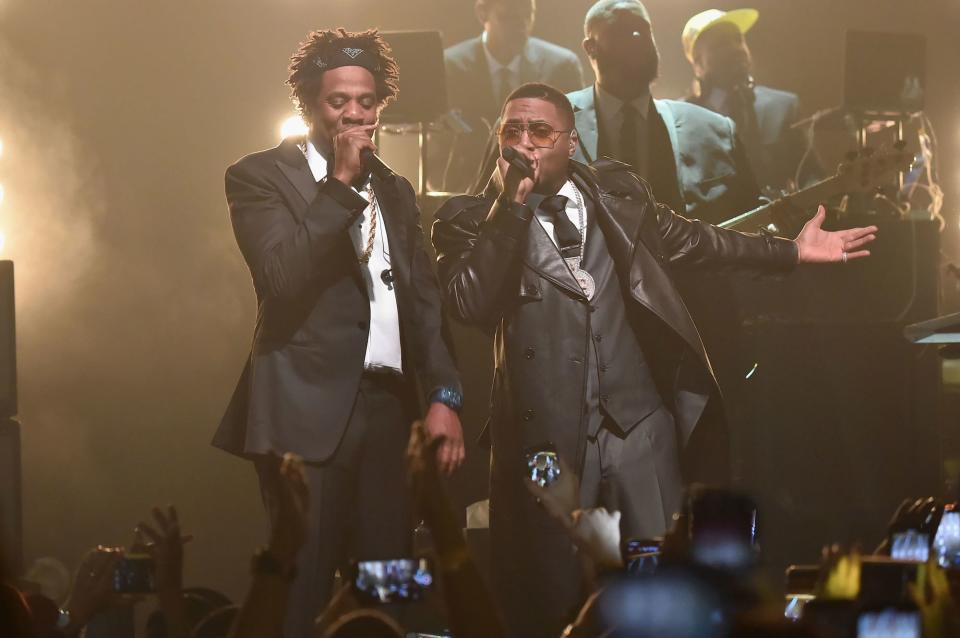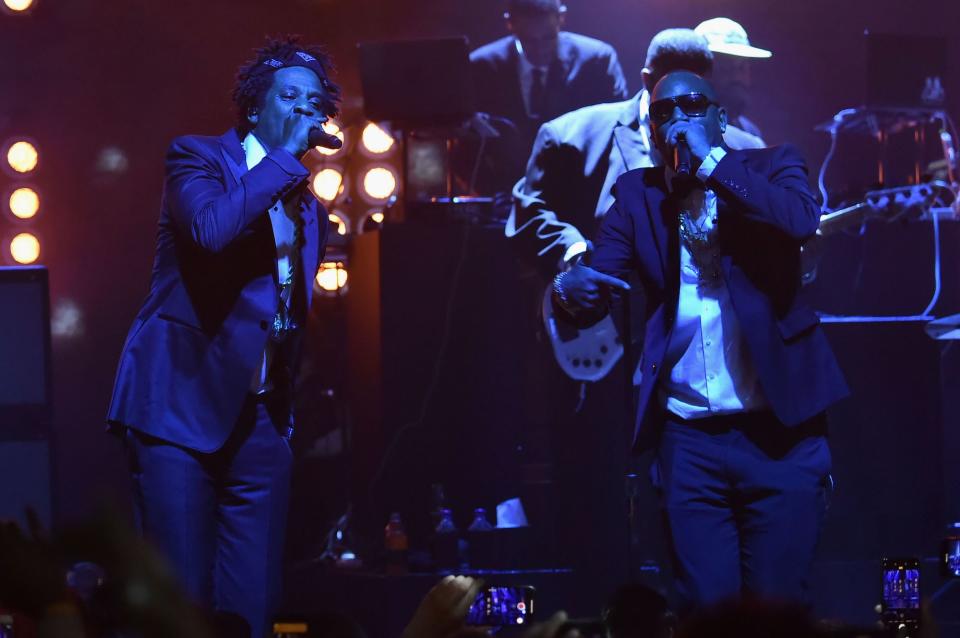JAY-Z, Forever New York’s Hometown Hero, Performs One for the Fans at Webster Hall: Review
In the middle of his bars-heavy “B-Sides 2” show at Manhattan’s Webster Hall Friday night, JAY-Z thanked fans for choosing his concert over Avengers: Endgame, the massive comic book blockbuster that shattered box office records by grossing $1.2 billion worldwide in five days. The comment felt funny coming from him, because JAY-Z has, more or less, become the rap equivalent of Endgame: a huge, bankable entity converting IP to coin at a rate that now feels inevitable. But on this night, in a more personal environment, he was less JAY-Z the brand and more JAY-Z the MC.
Leaning heavily on deep cuts and fan favorites, his B-Sides shows exist uniquely outside of the star’s outsized public standing, his massive solo shows at arenas like Madison Square Garden, or his collaborative tours with Beyoncé. They offer a place where he can be free from the obligation of playing “03 Bonnie & Clyde,” “Holy Grail,” and “Empire State of Mind.” The idea is for one of New York’s most accomplished rappers to get back to his roots. So what better setting for the second installment than the historic Webster Hall, which reopened on Friday for its first show in nearly two years?
JAY-Z once rapped that if skills sold he’d probably be “lyrically Talib Kweli”: “Truthfully I wanna rhyme like Common Sense/But I did five mil—I ain’t been rhyming like Common since.” This B-Sides show was a peek into that alternate universe. Adorned in a blue tuxedo and backed by a full band dressed to mirror him, his acumen was on full display. It was a clinic for one of rap’s great rappers, the reluctant technician.
In addition to scratching his rapper itch and placating the diehards who lament his pop stardom, the shows gave JAY-Z the opportunity to do cornerstones of his catalog that don’t work on the stadium level. A more intimate setting opens the door for the dedications of “Blueprint (Momma Loves Me),” the cripplingly personal notes to his late father “Adnis,” or the lounge raps of “Feelin’ It,” which always felt written for a smaller space and the support of a live band. This being the reopening of a famed New York venue, JAY kept it decidedly local. His set was pointedly selected to honor his hometown. Songs like “Marcy Me,” “American Dreamin’,” and the poised birthplace address “Where I’m From” took on special meaning in this context.

JAY-Z At Webster Hall
Throughout the epic set, song sequences were carefully thought-out, each live orchestration stunning. He’s always been a thoughtful live performer, but it’s hard to imagine that Beyoncé’s obsessive attention to detail hasn’t rubbed off on him a little. He was more exacting about which songs he played and how he played them, all the way through a three-song suite from American Gangster that ended with “Success” and culminated in an appearance with fellow local legend and foe-turned-friend Nas.
Together, the two New York rap kings seemed to reimagine a city where their riff never ruptured any fault lines. They performed some never-before-seen Illmatic-Reasonable Doubt mashups: Nas’ “The World Is Yours” crescendoed into the hook on “Dead Presidents II” with the two taking turns rapping each other’s verses and playing hype-men for one another. And during a performance of “N.Y. State of Mind,” JAY-Z appended his verse from “Bring It On,” which fit in so seamlessly it was as if it was preordained. When Hov and Nas quashed their beef in 2005, during the I Declare War concert, this is likely what many fans dreamed of as an endgame.

JAY-Z At Webster Hall
The reunions didn’t stop there as JAY-Z invited one-time Roc-A-Fella signee and another former nemesis, Cam’ron, out for “Welcome to New York,” and they were joined by Jim Jones for “I Really Mean It.” Hov and Cam have been squabbling, subliminally and outright, since Dame signed the latter to the Roc, and seeing the two once bitter rivals embrace felt like the closing of a loop and the end of an era.
The performance of rarities and oddities highlighted standouts from lesser albums, cuts from his mixtape The S. Carter Collection, and gems from deep in the back catalog, like the Memphis Bleek single “Dear Summer” and the one-off “People Talkin’.” Fittingly, the latter track got its first official release on the live album recorded during JAY’s taping for “MTV Unplugged 2.0,” which seems like a blueprint for this show; the relatively intimate setting, the live arrangements of his songs, the focus on his most personal material. At Webster, he tapped into something similar for a crowd full of superfans, doing a jazzy rendition of “Hovi Baby” and working through a few freestyles. Along the way, he pulled one of his greatest flexes: He started an a capella performance of “Friend or Foe,” a sidebar from his 1996 debut, Reasonable Doubt, and then the crowd rapped every word of the rest of it without assistance. The moment was a microcosm of the larger point of his B-Sides show, a subtle nod to how deep both his fandom and his discography run.

